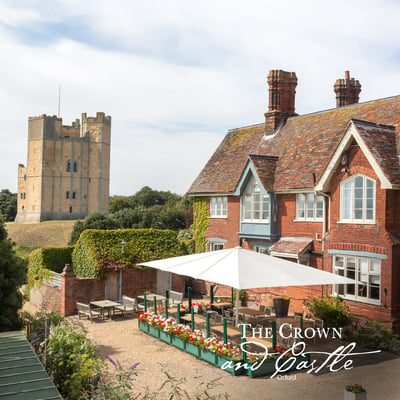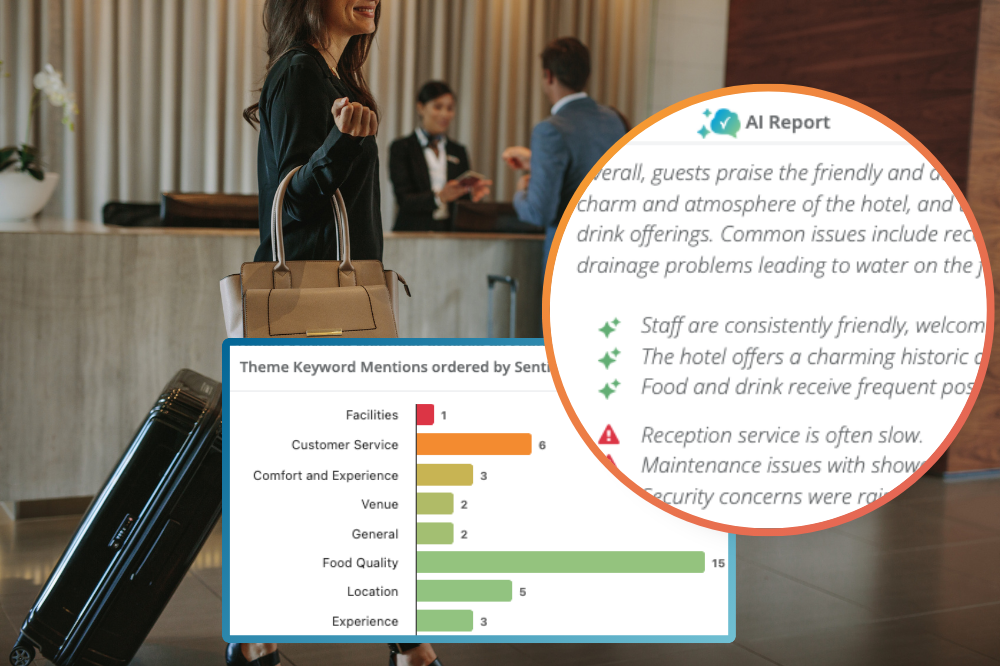The importance of an integrated tech stack
The Hotel Folk, GuestRevu & For-Sight
The Hotel Folk use GuestRevu with an integrated tech stack to understand how guests behave and adapt to their needs, while increasing direct bookings.
The Company
The Hotel Folk group comprises six privately-run hotels in Suffolk, UK, known for delivering exceptional guest experiences. With an annual occupancy of just over 70 per cent and around 150,000 customers across their hotels and restaurants, maintaining high service levels is the team's top priority.
“The ethos behind The Hotel Folk is all about the people who work in our hotels, ‘our folk’, and we put a lot of effort into their training and development so that they are able to deliver what we call a ‘blow your socks off hospitality experience’ for all of our guests,” says CEO David Scott.
As experts in providing great service, the community-oriented approach of The Hotel Folk sets them apart as a collective that is “obsessed with looking after guests”, as David would say. GuestRevu helps The Hotel Folk to optimise guest experiences and keep up with the ever-changing travel environment. It does this by integrating real-time guest feedback with perfectly timed future communications through their For-Sight CRM and marketing technology.
At a Glance
USP:
Boutique hotel group delivering “blow your socks off” hospitality — prioritising staff training, personalised service and guest-intelligence to create memorable stays.
Location:
Suffolk, England
Number of properties:
6 hotels
Key amenities & features:
-
Restaurant-led country hotels
-
Cosy, flexible room types
-
High-touch, personalised service
-
Data-driven guest care






The Challenges
Lack of integrated guest data
Although The Hotel Folk shared staff across their six hotels, their connection as a group was not reflected in their data. “We were individually run, really, so all of the hotels had their own brand by the name of their hotels, so The Hotel Folk never really united or brought anybody together in the sense of having a cohesive brand identity across the group,” David explains.
Feedback came from multiple channels, but nothing was consolidated. “It was just really hit and miss,” David recalls. “Most of the channels would be quite disparate. It may be on Booking.com, it could be on TripAdvisor, it could be on Google review, or they could be writing a letter with an issue to us, but nothing was bringing all of that feedback together”.
Staff had no centralised view of guest history or satisfaction, meaning decisions were made in isolation and opportunities to improve the guest experience were often missed.
Rising Guest Expectations and Changing Guest Profile
One of the lowest-scoring areas in The Hotel Folk’s guest feedback was value for money. This wasn’t about cleanliness or speed of service, but more intangible aspects of the stay. With prices rising globally, guests are spending more on hotel stays and dining out, making the quality of service and overall experience more important than ever. “If guests are more discerning about where they spend their money, we need to make sure we are offering a great experience,” says David.
“If guests are more discerning about where they spend their money, we need to make sure we are offering a great experience.”
– David Scott, CEO
Maintaining consistently high standards across all six hotels while ensuring every guest enjoyed a memorable stay was a significant challenge. Post-COVID, The Hotel Folk also welcomed a large number of new guests, whose needs and expectations differed from loyal returning customers. This added complexity to personalising communications and engagement strategies.
The Solution
Centralised Guest Data that Drives Engagement
By integrating GuestRevu’s real-time feedback and reputation management tools with For-Sight’s CRM and marketing platform, The Hotel Folk brought all their guest data together in one place.
This integration allowed the team to:
- Access client, sales and satisfaction data from a single, centralised system across all six hotels
- Understand and act on guest experiences more effectively
- Motivate staff by sharing positive feedback and recognising great performance
- Refine and personalise marketing campaigns based on guest behaviour and preferences
.png)
Having a connected tech stack has streamlined how The Hotel Folk use data to delight their guests. As David explains:
“I guess what I probably didn't understand at the beginning was actually how well as agencies they [GuestRevu and For-Sight] would work together. And it's probably that collaboration that's given the real power in the data and information that we have, because they have really championed and driven that forward, without me really having to get involved and drive that.”
– David Scott, CEO

Making Data Actionable and Efficient with AI
The Hotel Folk have also welcomed GuestRevu’s AI-powered features, which help uncover insights and save valuable time. AI analytics summarise guest comments and highlight key themes that might not be apparent from scores alone, helping hoteliers quickly understand sentiment. This brings the guest experience to life, showing staff what matters most beyond the numbers.
“What’s really golden within a guest review is not necessarily the score, but it’s the comment that the guest has written [...] The AI tools really help you bring those words to life in a format that’s really easy to digest and the staff can understand.”
– David Scott, CEO
GuestRevu’s AI Management Responses have also helped teams reply to reviews efficiently. The system generates high-quality, on-brand responses that staff can personalise before publishing, saving time while maintaining a genuine, thoughtful human tone.
We can add value in so many different ways as well as making ongoing operational improvements to standards and procedures to make sure that we get it right every single time. If you don't use it, then I would definitely say that you're missing out.
The Results
Improved Net Promoter Score
Since implementing GuestRevu, The Hotel Folk’s overall Net Promoter Score has risen from 52 in 2018 to around 63.5 in 2025. David attributes this increase to several factors: staff training that allows employees to deliver a better experience, targeted investment in the physical facilities guests enjoy, and, most importantly, staff understanding where issues occur so they can quickly address them. “Over time, we've just got better and better at eradicating issues and improving overall satisfaction,” he explains, “ultimately getting guests to come back to us and enjoy eating or staying in the hotel.”
Direct guest feedback leads to quicker solutions
Feedback from guests empowers The Hotel Folk to make necessary operational changes quicker, and with attention to detail.
When the feedback comes from guests, the staff are often more proactive in their response, because that feedback is from the personal perspective of the guest, rather than a professional perspective from management.
“It almost changes the sentiment of what that (feedback) actually means – it’s not me, it's not the hotel manager, it’s not someone within our business talking about it; it's actually a guest giving you real-time feedback to say, ‘this could be better’ and I think quite often that gets a better response from the staff than actually us pointing it out ourselves.”
– David Scott, CEO
Increased Efficiency with AI
AI has made guest data more actionable and streamlined review responses, helping staff quickly understand what matters most to guests and focus on actions that will improve the guest experience. The AI analytics tools enable the team to spot trends early and make improvements before small issues become bigger problems.
In addition, AI has helped The Hotel Folk respond to reviews quickly and consistently, which also boosts online visibility. Google’s algorithms take into account how businesses engage with guest feedback, so timely responses can improve search rankings, helping The Hotel Folk appear higher in search results and reach more potential guests.
“Using AI to help us build responses and talk to guests allows us to be quicker and more efficient. In an environment where labour costs are increasing, we want to leverage those AI improvements so that we can spend less money on labour and actually let the computer do a bit more for us.”
– David Scott, CEO
Personalised marketing messages to increase direct bookings
Integration with For-Sight enables the group to segment guests into new versus loyal audiences, tailoring communications and campaigns for each. This allows The Hotel Folk to create richer, more engaging messages that resonate with each guest. David explains that understanding whether a guest is visiting for the first time or returning helps them decide how much investment and personalisation to put into communications.
“We go through some very complicated segmentation modelling using the data through For-Sight and then combining that with the trends that we see through GuestRevu. Often we've got various different email formats or pieces of communication that are very personalised to lots of different groups of people,” David explains. “Then we enhance what's going well or change what isn't working – and that can change through the time of year; it can change [depending] on what the weather’s doing – so we track all of those things to make sure that we optimise all of our marketing communications.”
This level of personalisation and adaptability has led to a noticeable uplift in direct bookings across the group, as guests respond positively to tailored messages that speak to their individual experiences.
Having this integration also ensures messages align with each guest’s experience: David notes, “Otherwise, you just run the risk of looking stupid because you’ve sent the guest a message that completely contradicts their previous experience – good or bad.”
Uniting and motivating staff with an integrated tech stack
Having the same integrated tech stack across the hotel group meant The Hotel Folk were operating in sync. An employee could easily move between any of the hotels, possessing the knowledge of each system meant no momentum would be lost in the teams and standards would always be of the highest quality. This made the working environment even more conducive for the folk, and the output was commendable service every day.
Not only did the use of an integrated tech stack streamline and motivate their staff, The Hotel Folk also benefited from the access to more attention to detail. As David puts it, “From an internal point of view it's really powerful. We use it to inform our refurbishment programme, we understand by room type where the biggest issues are in certain bedrooms so we can focus our maintenance teams and our refurbishment into those specific areas, so we can add value in so many different ways as well as making ongoing operational improvements to standards and procedures to make sure that we get it right every single time,” he further explains, adding “if you don't use it, then I would definitely say that you're missing out.”
“GuestRevu as a company are very guest-oriented. They’ve really done a good job of embracing new technology and challenging us to think about how we could do things quicker and more efficiently. That’s exactly what you want from a supplier, someone giving you the solution before you’ve even thought of the problem.”
– David Scott, CEO
Read these case studies next...
Africa
MINT hotels
Group in Johannesburg, South Africa
MINT Hotels use GuestRevu as part of their best-in-breed tech strategy: finding top contenders in each category and then creating a seamless integration.
Africa
Royal St Andrews
Independent in Port Alfred, South Africa
Royal St Andrews Hotel implemented GuestRevu from day one to gather structured guest feedback, manage online reputation, and enhance their service offerings.
Europe
Breaffy House Resort
Resort in Mayo, Ireland
Breaffy House near Castlebar, Ireland is a large resort by any standards. But across their wide range of facilities, one goal remains a constant for GM, Wilson Bird.

